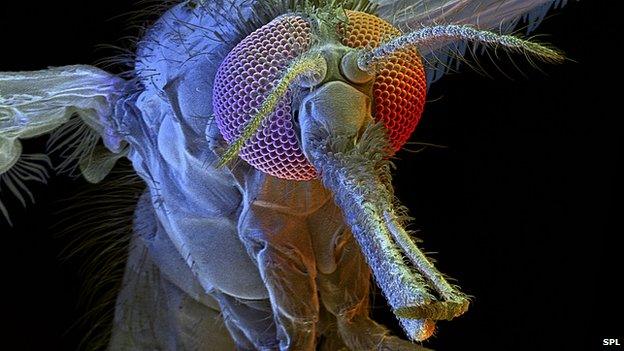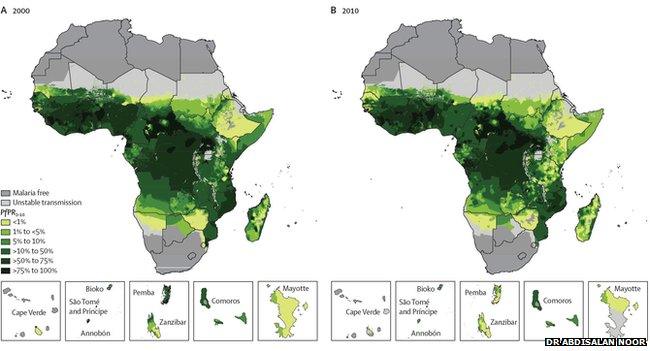'Keep focus' on fighting malaria in Africa, doctors say
- Published

Malaria is spread between people by infected mosquitoes
Tackling malaria in Africa has had "great successes" but the world must "not take the foot off the gas", doctors warn.
Their detailed analysis of the disease, published in the Lancet, external, shows 184 million people still live in areas where more than half of children show signs of malarial infection.
But they say "a lot more needs to be done" in high-risk areas.
Globally 627,000 people die from malaria each year, mostly in Africa.
The Wellcome Trust researchers analysed data from 26,746 community studies involving more than 3.5 million people from 44 countries in Africa.
They plotted the proportion of two to 10-year-olds carrying malarial parasites. Children are most at risk before immunity to the parasite starts to develop.
Not all cases will lead to disease, but it gives a clear idea of the prevalence of malaria.

The dark green areas show the high prevalence of malaria in central Africa
The research showed that between 2000 and 2010 there was a fall in the prevalence of malaria in 40 of the countries studied.
The number of people in high transmission areas (which have more than 50% of children carrying malarial parasites) fell from 218 million to 184 million.
Uganda and Democratic Republic of Congo have some of the highest malaria prevalence figures in Africa.
One of the researchers, Dr Abdisalan Mohamed Noor, of the Kenya Medical Research Institute Wellcome Trust Research Programme, told the BBC: "It's a mixed message. It has been a great success in several countries, but more needs to be done.
'Proven interventions'
"Drug and insecticide resistance are a big threat to the gains made so far, and we need to be careful not to take the foot off the gas, thinking it's no longer a problem."
Commenting on the findings, Prof Brian Greenwood, of the London School of Hygiene and Tropical Medicine, and Dr Kwadwo Koram, of the Noguchi Memorial Institute of Medical Research in Ghana, said: "The reductions in malaria transmission that have been achieved in much of sub-Saharan Africa, although encouraging, have been only modest.
"More could be done to improve malaria control in high-risk countries by increasing coverage with proven interventions, such as insecticide-treated nets and chemoprevention."
- Published1 June 2011
- Published10 November 2011
- Published21 April 2011
- Published8 October 2013
- Published25 December 2013